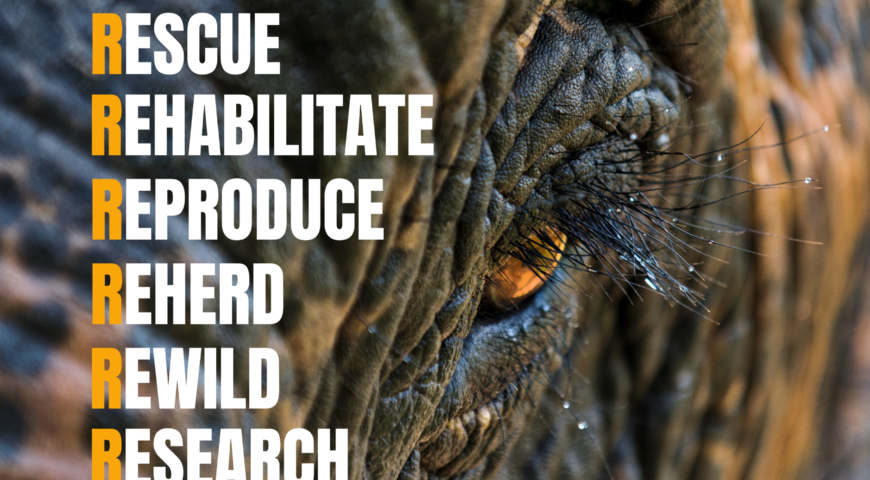
The Elephant Conservation Center’s Mission of the 7 Rs
Welcome to our latest update at the Elephant Conservation Center. We are proud to share our mission and accomplishments centred around our 7 Rs: Rescue, Rehabilitate, Reproduce, Reherd, Rewild, Research, and Respect. These principles guide our comprehensive approach to preserving and protecting Asian elephants, reflecting over two decades of dedicated work.
RESCUE
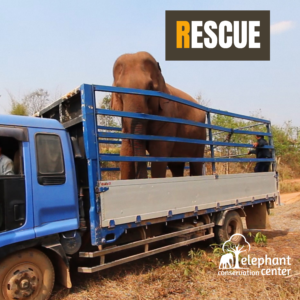
At the Elephant Conservation Center (ECC), our conservation work begins with rescue. All of our elephants, except those born at the center, have been rescued and brought here for a second chance at life in a natural environment spanning over 530 hectares.
Until 2018, most elephants in Laos were employed in the logging industry. When the government banned illegal logging, many elephants were left without work and were either sold to tourist venues or kept for breeding. To ensure their safety and well-being, we strive to purchase these elephants whenever they are put up for sale.
Among our residents, 12 elephants were rescued from an international trafficking ring. In a decisive act, the then Prime Minister of Laos halted the traffickers just as they were about to board a plane in Vientiane, directing that the elephants be brought to ECC for care. We gladly welcomed them into our center.
Additionally, we have rescued elephants that were being exploited in a laser night show at a Chinese-owned casino near the northern border of Boten. In another instance, we took in an elephant handed over by our partner organisation, Lao Conservation Trust for Wildlife (LCTW), as the conditions at ECC were deemed more suitable for the animal’s well-being.
These rescues mark the beginning of our commitment to providing a safe and natural habitat for elephants in Laos.
REHABILITATE
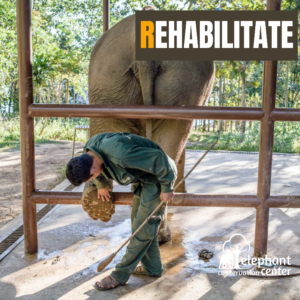
Once rescued, elephants often require extensive physical and psychological care. As the only elephant hospital in Laos, our dedicated Vet & Biology Department—consisting of one permanent Laotian vet, one vet technician, and three biologists—delivers high-quality medical care and rehabilitation. Equipped with a state-of-the-art treatment facility, laboratory, and pharmacy, our team is well-prepared to provide the best possible care. We utilise positive reinforcement techniques in training, ensuring a safer care process for both staff and elephants. Our hospital is open to any elephant in need and also serves as a training ground for veterinary students. In 2024, we are launching a brand new Mobile Veterinary Clinic (WILDMED) to extend our care beyond the Center. This initiative, in collaboration with our partner Lao Conservation Trust for Wildlife (LCTW), is supported by the IUCN ProBioDev programme, the Wyss Academy for Nature, UNIVET Nature, the British Embassy in Laos, Eurofins Foundation, and the NGO Des Éléphants & Des Hommes.
For more information:
REPRODUCE
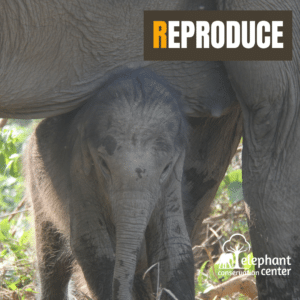
Conserving an endangered species like the Asian elephant requires not only protection but also proactive efforts to ensure a sustainable and genetically diverse population. At our facility, we operate the only elephant breeding programme in Laos, a critical initiative aimed at maintaining genetic diversity and increasing the elephant population within a controlled and secure environment.
A major challenge in this endeavour is the low natality rate among an ageing elephant population, with current figures indicating only two births for every ten deaths annually. This demographic imbalance poses a serious threat to the long-term survival of the species.
Our breeding programme integrates the traditional knowledge of mahouts—who have centuries of experience managing elephants—with advanced scientific techniques to optimise reproductive success. This includes the use of hormonal assays, such as progesterone and oestrogen level monitoring, to accurately determine optimal breeding windows and diagnose pregnancy at an early stage. Additionally, we employ semen analysis to enhance breeding outcomes.
By combining these approaches, we aim to address the critical reproductive challenges faced by the Asian elephant population, thereby contributing to the species’ conservation and long-term viability.
REHERD
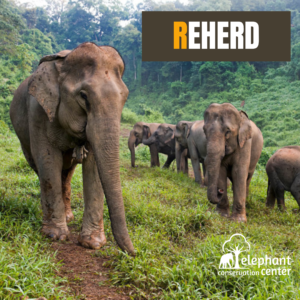
Establishing social groups within our elephant population is a process grounded in a comprehensive understanding of their natural behaviours and social dynamics. Many of the elephants rescued and brought to the Elephant Conservation Center (ECC) have endured significant psychological trauma due to prolonged isolation, exploitation, and overwork. These adverse experiences can lead to a range of behavioural issues, making the reintegration of these elephants into social groups a delicate and complex task.
At the ECC, our team of caretakers and biologists conducts meticulous observations of each elephant’s behaviour, paying close attention to their interactions, communication patterns, and social preferences. This detailed behavioural analysis is crucial for identifying potential bonds between individuals and determining the most compatible groupings. The goal is to replicate the social structures found in wild elephant populations, which are vital for their psychological well-being.
The creation of stable, well-integrated herds is not only essential for the elephants’ current well-being but also for their future potential rewilding. A strong, cohesive social group provides the foundation for successful reintroduction into natural habitat, where social bonds play a critical role in survival and adaptation. Our work in this area highlights the importance of understanding and supporting the complex social needs of elephants, ensuring that they can thrive both in captivity and, eventually, in the wild.
REWILD
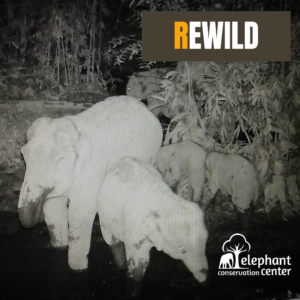
Rewilding elephants stands as one of our most ambitious and transformative objectives. Our groundbreaking rewilding programme is uniquely positioned as the sole initiative in Laos dedicated to the successful reintroduction of elephants into their natural habitat, thereby contributing significantly to regional biodiversity conservation.
In 2019, we achieved a landmark milestone by successfully reintroducing four elephants into the Nam Pouy National Protected Area. This historic endeavour involved a meticulous and multi-faceted approach, ensuring that each elephant was not only physically prepared but also socially and behaviourally equipped for life in the wild.
Key components of our rewilding strategy include the formation of a compatible herd, which is critical for social stability and survival in natural environments. The process required extensive behavioural assessments and the application of advanced enrichment techniques to foster natural social bonds and interactions among the elephants. Additionally, our programme emphasises the development of essential survival skills, such as foraging, navigation, and self-defence, which are crucial for their adaptation to the wild.
Our rewilding efforts are underpinned by rigorous scientific protocols and continuous monitoring to evaluate the elephants’ adaptation and overall well-being post-release. This comprehensive approach not only aids in the successful integration of these elephants into their new environment but also enhances our understanding of the broader ecological impacts of rewilding initiatives.
By pioneering this rewilding programme, we aim to restore ecological balance and contribute to the preservation of elephant populations, setting a precedent for future conservation projects in the region.
RESEARCH
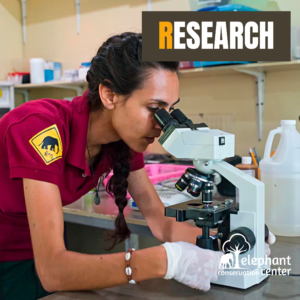
Our dedication to research seamlessly integrates traditional knowledge with contemporary scientific methods, advancing our understanding of elephant biology and conservation. At the Elephant Conservation Center (ECC), we are equipped with state-of-the-art research facilities, including a cutting-edge endocrinology lab, a sophisticated diagnostic lab, and a DNA lab, developed in collaboration with The Smithsonian Conservation Biology Institute.
These advanced laboratories play a pivotal role in supporting pioneering scientific research, providing critical insights into various aspects of elephant health and behaviour. Our efforts are significantly strengthened by our team of three experts who are active members of the IUCN SSC Asian Elephant Specialist Group, ensuring that our work adheres to the latest global standards and practices.
Our research capabilities have been further enhanced through strategic partnerships with renowned international institutions, supported by contributions from Australian Aid, Wyss Academy for Nature, and private donors. These collaborations have facilitated the development of precise methodologies for monitoring hormonal cycles, studying the physiological and behavioural effects of musth and stress hormones, and optimising our breeding programmes.
Through these concerted efforts, we aim to deepen our scientific knowledge and improve the effectiveness of our conservation strategies, ensuring the well-being and preservation of Asian elephants.
RESPECT
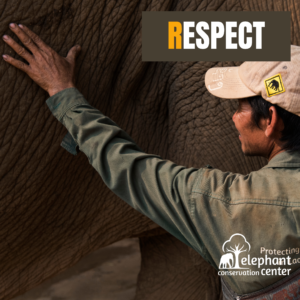
Respecting elephants means safeguarding both their natural habitat and the cultural heritage of their human caretakers. At the Elephant Conservation Center (ECC), we prioritise the protection of elephants in their natural environment by training and supporting a dedicated ranger team in the Nam Pouy National Protected Area, tasked with conserving wild elephant populations and their ecosystem.
Equally, we hold Lao mahouts and their traditional knowledge and way of life in high regard. Beyond creating a safer environment for wildlife, the ECC collaborates closely with local communities, fostering scientific tourism, delivering environmental education to schoolchildren, and promoting alternative agriculture projects to generate sustainable income. Our ranger team, supported by the Government of Laos, also conducts anti-poaching patrols and vital habitat protection efforts.
Our Journey and Impact
Since 2001, the ECC team has been actively involved in a range of initiatives aimed at protecting Asian elephants. These efforts include setting up a registration system for captive elephants, mobile veterinary clinics, emergency response cards, protocols for the immobilisation of elephants in ‘musth’, an elephant care manual, national anti-trafficking campaigns, good practice guides for tourism, and mobile libraries for local communities. In 2010, the ECC opened to the public with just one elephant and a concession of 105 hectares. By 2017, we had 13 elephants. In early 2018, the government halted the illegal sale of 12 elephants, sending them to the ECC and extending our land concession by a further 435 hectares. Today, our 30 elephants have access to 6,000 hectares of forest, making them the largest herd under human care in the country.
Our mission continues, and our commitment to the 7 Rs guides our efforts to create a sustainable future for Asian elephants. Together, we can ensure a brighter future for these remarkable animals and their habitat.
ACES Conservation Leadership Award
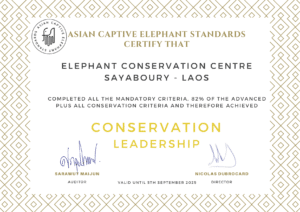
We are proud to announce that the Elephant Conservation Center has been honoured with the Conservation Leadership Award 2024 from the Asian Captive Elephant Standards. This esteemed recognition underscores our steadfast commitment to elephant care, conservation, and rewilding. It highlights our leadership in advancing these efforts and reinforces our determination to continue pioneering sustainable solutions for the future of Asian elephants. This award not only celebrates our achievements but also amplifies our impact, enabling us to collaborate with other leaders in the field.
SUPPORT OUR CAUSE
Sponsor an Elephant
Our “Sponsor an Elephant” donation programme is vital for our conservation efforts. Each elephant costs approximately $600 per month for food and medical expenses, totalling over $200,000 annually for our 30 elephants. Following a recent dry season and reduced produce from our food plantation, we have had to purchase food from local growers, where fresh produce costs have risen significantly.
Furthermore, if an elephant falls ill, medical costs can increase sharply. The soaring prices of basic medical supplies in Laos, exacerbated by economic conditions and poor currency rates, put additional strain on our resources.
Therefore, your donations to sponsor an elephant are crucial and needed throughout the year to support our conservation programmes.
Rewilding Program: Securing the long-term success of our released elephants
To ensure the long-term success of our elephant rewilding programme, we urgently need funding to cover essential costs. This includes securing salaries for our dedicated field teams, managing logistics, conducting regular veterinary checks, and covering administrative expenses. Maintaining this critical project requires an annual budget of £24,000.
Our rewilding efforts are crucial for the future of released elephants, helping them adapt and thrive in their natural habitat. By supporting this programme, you contribute to the well-being of these magnificent animals and the preservation of their ecosystems. Your generosity is vital to help us continue this important work and ensure the sustainable rewilding of elephants.

